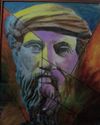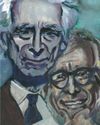
In 1995 the English mathematical biologist John Maynard Smith published The Major Transitions in Evolution. Maynard Smith was a co-developer of gene-centred evolutionary biology in the 1960s and the founder of evolutionary game theory in the early 1970s, and what this book was quietly saying about high intelligence can be considered revolutionary, or at least, notably evolutionary. As a result of a paper I wrote about evolution in the journal Philosophy in 1998, I ended up friends for the last decade of his life with the other co-developer of gene-centred evolutionary biology, the American biologist George C. Williams. And like Maynard Smith and the early Darwinians (including Darwin), Williams was fascinated by the so-called ‘high intelligence paradox’ and the evolutionary problems it implies. One of the early Darwinians even turned to philosophy to try to solve the paradox.
Although evolution is predominantly gradual, theoretical biologists recognise a series of major transition events, which involved profound changes in the way information is stored and transmitted between generations. In his Major Transitions, Maynard Smith recognised eight of them across the four billion years of life on this planet, including the early move from an RNA world to DNA, the transition from prokaryotic to eukaryotic cells, and the transition from asexual to sexual reproduction. His seventh major evolutionary transition was the genetic flip-switch that allowed some species to live in large colonies, curing Darwin’s headache about non-reproductive insect castes and sterile workers. High intelligence through language was
This story is from the October/November 2024 edition of Philosophy Now.
Start your 7-day Magzter GOLD free trial to access thousands of curated premium stories, and 9,000+ magazines and newspapers.
Already a subscriber ? Sign In
This story is from the October/November 2024 edition of Philosophy Now.
Start your 7-day Magzter GOLD free trial to access thousands of curated premium stories, and 9,000+ magazines and newspapers.
Already a subscriber? Sign In

FALLING DOWN
Thomas R. Morgan considers how personal identity is maintained, and how it is lost.

Pythagoras (570-495 BCE)
Daniel Toré looks beyond the mathematician to the philosopher.

Wordsworth & Darwin
Christine Avery wonders whether poetry can help us to deal with science.

Plants & Philosophy
Caroline Deforche sees similarities between gardening and philosophising.

Dr.Gindi sculptor, has a philosophical conversation with Richard Baron about sensation, life, infinity and, you guessed it, sculpture.
Dr. Gindi is one of Switzerland's foremost sculptors, whose work has been exhibited in many countries.

Thomas Aquinas on Extraterrestrial Life
Babatunde Onabajo tells us why Aquinas did not believe in aliens.

The Fire This Time
Tim Madigan on Ray Bradbury, Bertrand Russell and Fahrenheit 451.

Trust, Truth & Political Conversations
Adrian Brockless wants a recognition of human value in political debate.

Philosophy & The Crown
Vincent Di Norcia on monarchy and stability.

Technologists & Ethicists
Stephen L. Anderson laments inadequate moral insight among tech leaders.